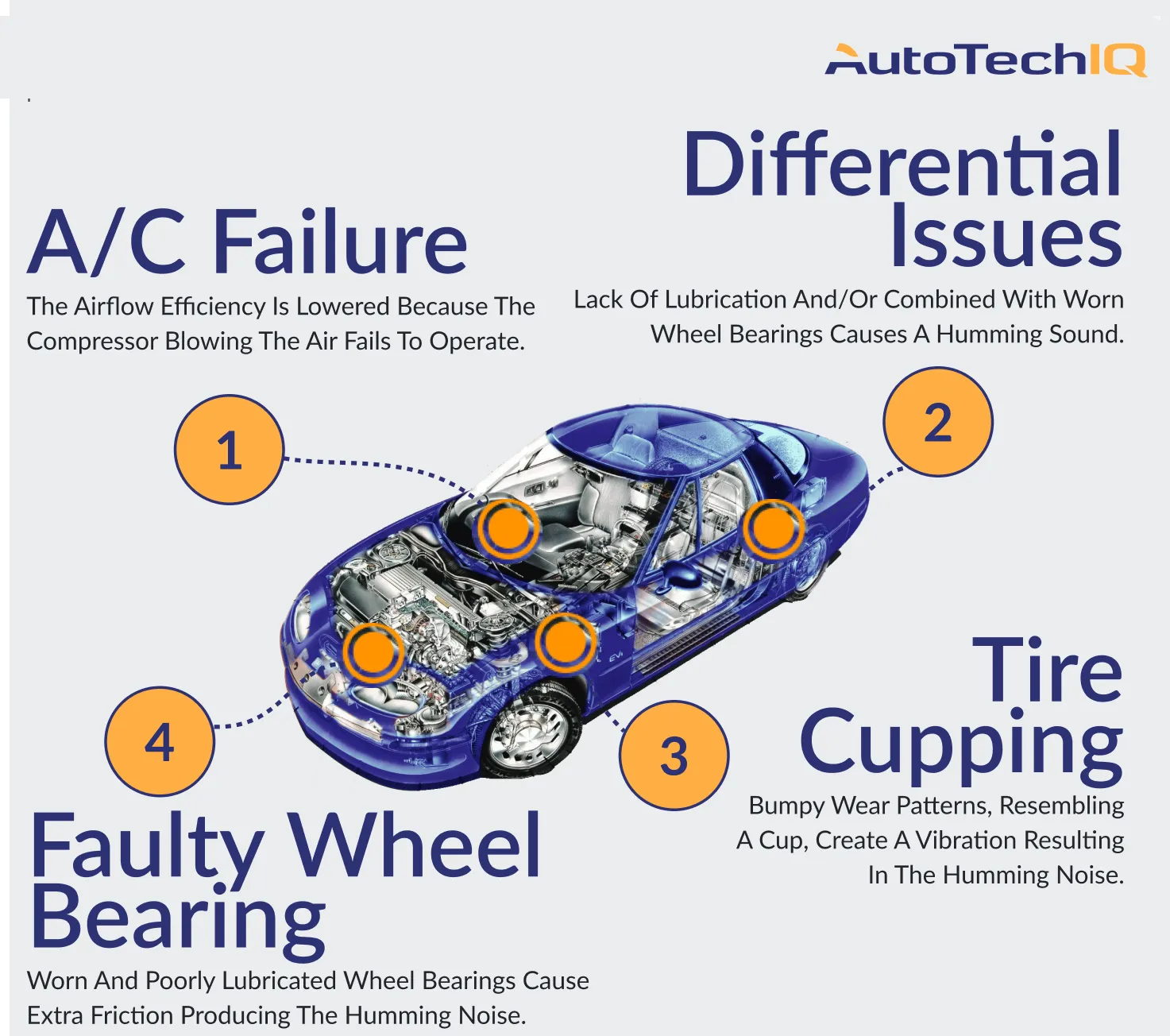That unsettling *car making humming noise from engine* can be a source of worry for any driver. It’s not just a random sound; it’s your vehicle trying to communicate a potential problem. Identifying the precise nature and origin of this *car making humming noise from engine* is crucial for preventing minor issues from escalating into costly repairs. This guide will explore some of the most common culprits behind engine humming, providing you with the knowledge to diagnose the issue and take appropriate action. Understanding the context of when the noise occurs, such as during acceleration, idling, or turning, can significantly narrow down the potential causes.
Common Culprits Behind Engine Humming
A humming noise emanating from your car’s engine can stem from a variety of sources. Pinpointing the exact location and circumstances under which the noise occurs is key to identifying the problem.
- Alternator Issues: A failing alternator can produce a noticeable humming sound, often increasing in pitch with engine speed. This is usually due to worn bearings.
- Power Steering Pump: A low power steering fluid level or a failing pump can cause a humming or whining sound, especially when turning the steering wheel.
- Idler Pulley/Tensioner: These components help maintain tension on the serpentine belt. Worn bearings in these pulleys can create a humming or grinding noise.
- Vacuum Leak: A vacuum leak can cause a variety of noises, including a humming or whistling sound. Check all vacuum hoses for cracks or leaks.
- Transmission Problems: In some cases, transmission issues, particularly low fluid levels or internal wear, can manifest as a humming sound.
Diagnosing the Humming Noise
Before rushing to a mechanic, consider these diagnostic steps to help identify the source of the humming:
- Listen Carefully: Pay close attention to when the humming occurs. Does it happen at idle, during acceleration, or only when turning?
- Check Fluid Levels: Verify that your power steering, engine oil, and transmission fluid levels are within the recommended ranges.
- Inspect the Serpentine Belt: Look for signs of wear, cracking, or fraying on the serpentine belt.
- Listen with a Stethoscope (Optional): A mechanic’s stethoscope can help isolate the source of the noise by amplifying sounds from specific components.
A Comparison of Potential Causes
| Possible Cause | Symptoms | When Noise Occurs |
|---|---|---|
| Alternator | Humming that increases with engine speed, dimming headlights | During engine operation |
| Power Steering Pump | Humming or whining, difficulty steering | When turning the steering wheel |
| Idler Pulley/Tensioner | Humming or grinding noise | During engine operation |
| Vacuum Leak | Humming or whistling, rough idling | During engine operation, especially at idle |
PREVENTATIVE MEASURES TO MINIMIZE ENGINE NOISE
While some engine noises are unavoidable signs of wear and tear, there are several preventative measures you can take to minimize the likelihood of developing a concerning hum:
– Regular Maintenance: Adhering to your vehicle’s recommended maintenance schedule is paramount. This includes regular oil changes, fluid top-offs, and inspections of belts and hoses.
– Quality Fluids: Using high-quality engine oil, power steering fluid, and transmission fluid can contribute to smoother operation and reduced wear.
– Proper Belt Tension: Ensure that your serpentine belt and other drive belts are properly tensioned. A loose belt can cause slippage and noise.
– Address Issues Promptly: Don’t ignore minor noises or performance issues. Addressing them early can prevent them from escalating into major problems.
SEEKING PROFESSIONAL HELP
If you’ve tried troubleshooting the humming noise yourself and are still unsure of the cause, it’s always best to consult with a qualified mechanic. They have the expertise and tools to accurately diagnose the problem and recommend the appropriate repairs; Attempting to fix complex engine issues without proper knowledge can potentially cause further damage and increase repair costs. A professional can perform a thorough inspection, using specialized equipment to pinpoint the source of the noise and provide you with a detailed assessment of the necessary repairs.
Ultimately, understanding why your car might be *car making humming noise from engine* empowers you to take proactive steps in maintaining your vehicle’s health and longevity. By paying attention to unusual sounds and seeking professional help when needed, you can ensure a smoother and more reliable driving experience.
ADVANCED TROUBLESHOOTING TECHNIQUES
For the mechanically inclined, there are additional steps you can take to further diagnose the humming noise. However, proceed with caution and ensure you have the necessary tools and knowledge to avoid causing damage.
– Voltage Drop Testing: Use a multimeter to check for excessive voltage drop across the alternator’s terminals. A significant voltage drop can indicate a failing alternator.
– Belt Inspection with Engine Running (Carefully!): With extreme caution and proper eye protection, briefly observe the serpentine belt and pulleys while the engine is running; Look for wobbling, misaligned pulleys, or excessive belt vibration. *Never* put your hands or any objects near a running engine’s belts or pulleys.
– Isolate Accessories: Try disconnecting accessories like the air conditioning compressor or power steering pump (if accessible and safe to do so) to see if the humming noise disappears. This can help narrow down the source.
THE ROLE OF VEHICLE AGE AND MILEAGE
The likelihood and types of engine humming noises can be influenced by the age and mileage of your vehicle. Older vehicles with higher mileage are naturally more prone to wear and tear on components like bearings, pulleys, and pumps. This wear can lead to increased noise levels and potential failures. Furthermore, certain models are known to have specific issues that commonly manifest as humming noises. Researching your vehicle’s make and model online can provide valuable insights into potential problem areas and common complaints from other owners.
Preventive maintenance becomes even more critical as a vehicle ages. Regular fluid changes, belt replacements, and inspections can help prolong the life of these components and reduce the risk of developing unwanted noises. Don’t neglect scheduled maintenance just because your car is older; in fact, it’s even *more* important to keep up with these tasks as the vehicle gets older.
THE IMPORTANCE OF PROMPT ACTION
Ignoring a *car making humming noise from engine* is rarely a good idea. While some noises might be relatively benign, others can indicate serious underlying problems that can lead to costly repairs or even breakdowns. Early detection and prompt action are key to preventing minor issues from escalating into major ones. For example, a failing alternator can eventually leave you stranded with a dead battery, while a worn power steering pump can make steering difficult and potentially dangerous.
Moreover, addressing engine noises promptly can help maintain your vehicle’s overall value and reliability. A well-maintained vehicle is not only safer and more enjoyable to drive but also holds its value better over time. So, if you hear an unusual humming noise coming from your engine, don’t hesitate to investigate and seek professional help if needed. The first step to fixing a *car making humming noise from engine* is to determine where it is coming from.





